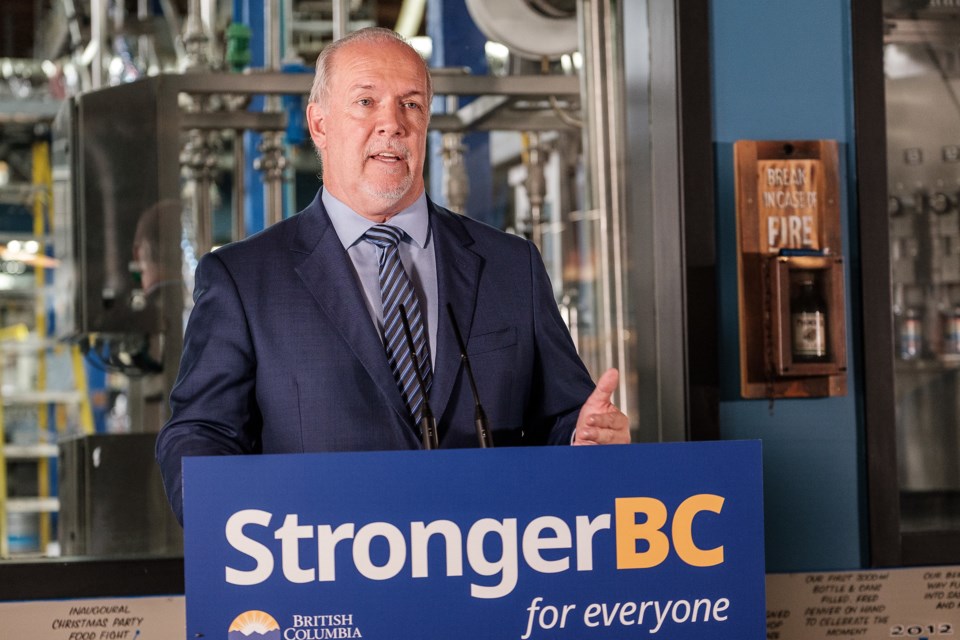It was almost one year ago exactly that B.C. Premier John Horgan and then Finance Minister Carole James held their first press conference dedicated entirely to the economic fallout of the pandemic.
Their goal, they said, was to begin crafting government aid programs, on the fly, to respond to the job losses, bankruptcies and foreclosures caused by the largest public health crisis and steepest economic collapse in modern history.
Twelve months later, the government is still very much making it up as it goes along.
This week, the province unveiled the first aid packages geared entirely for inter-city bus operators and regional airports. They are sectors particularly hard-hit by the travel restrictions implemented to combat the spread of the virus.
“It was really a discussion with the motor coach coalition and individual bus operators about how could we best create a program out of thin air, if you’d like, and not for the first time in this pandemic,” said Transportation Minister Rob Fleming.
Bus companies have been warning for months they might have to cut off service entirely to rural communities, which would be a devastating loss to remote residents who rely on them as a primary method of transportation.
The province took its sweet time in responding.
It’s amazing that one year into the crisis, the government is still only rolling out financial help to certain sectors for the first time now.
But eventually it came through, in the form of $10.7 million in grants for bus operators and $16.5 million in grants or regional airports. The funding has a runway of a year, allowing companies to get subsidies for certain routes, depending on how the pandemic plays out.
The premier picked up the endorsement of Wilson’s Transportation, a major player in the sector, which had been hounding the government for months to do something, anything, to keep its business from collapsing.
Still, it’s amazing that one year into the crisis, the government is still only rolling out financial help to certain sectors for the first time now.
As Fleming explained, some companies watched a rebound of business last summer when restrictions were eased and the virus was subdued by the warmer weather. Then, when the second wave hit in the fall, they found themselves in even worse financial shape than when the pandemic started in the spring, with little hope on the immediate horizon.
“The biggest difference between now and any other time in our history was there was not something on the shelf that says here’s your program for when an entire economy disappears,” said Horgan,
The premier has described developing pandemic aid programs as akin to building an airplane while in mid-flight.
“Has it been challenging to get to this point? Absolutely. But there was not a roadmap.”
One year later, there’s lots to criticize in what the province has actually produced.
Its marquee $300 million small business grant program is an unmitigated disaster, having been unable to give away money after three revisions. Its tax deferrals, while welcome, are temporary and not amounts that will be forgiven. The tourism sector has had to beg for help, and only received some of what it asked for. Bus companies were left waiting for months; airports waited a year.
One year later, there’s lots to criticize in what the province has actually produced.
And the province’s largest businesses, which were excluded from the small business grant program, have received virtually no direct aid of any kind since the pandemic started.
Horgan said he’s working on something for them. At this point, it seems more likely to land in the April 20 budget. By then, B.C. will be into its 13th month and counting of making it up as it goes along.
Rob Shaw has spent more than 13 years covering BC politics, now reporting for CHEK News and writing for The Orca. He is the co-author of the national best-selling book A Matter of Confidence, and a regular guest on CBC Radio.
SWIM ON:
- Through no fault of Dr. Bonnie Henry, getting clarity on public health orders is slow at best, and impossible at worst. Rob Shaw says there must be a better way.
- A year ago, the Business Council of BC started looking ahead to what the province might be facing economically.
- Roslyn Kunin offers one idea for national economic recovery - a Canadian Common Market.



